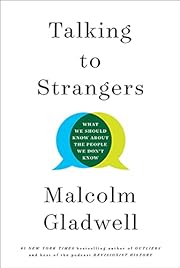

Fai clic su di un'immagine per andare a Google Ricerca Libri.
|
Sto caricando le informazioni... Talking to Strangers: What We Should Know About the People We Don't Knowdi Malcolm Gladwell
 Top Five Books of 2019 (195) » 5 altro Sto caricando le informazioni...
Iscriviti per consentire a LibraryThing di scoprire se ti piacerà questo libro. Attualmente non vi sono conversazioni su questo libro.   ) )There's a lot to like about this book, and [[Malcolm Gladwell]]'s writing in general - you can read the reviews below for yourself. I'll stick to the one quibble I have with Gladwell's conclusions. In a late section in the book, he focuses on a lot of the research around detecting deception, agreeing with the conclusions in that research that law enforcement is not very good at detecting when someone isn't telling them the truth. The problem with the underlying research is that it is almost completely laboratory studies, most which is designed around college students and unrealistic situations. The typical is that a college volunteer is put in front of a computer and told to type but not to ever touch the ESC key. The researchers then confront the volunteer, saying they touched the ESC key. Some volunteers lie, some don't, and others watch five minute videos to determine who is telling the truth. Then, they show the videos to some law enforcement and everyone functions about chance levels. But to extrapolate that a cop, who is used to asking the questions themself, based on evidence and gathered information, in a lengthy interview, is poor at determining deception based on viewing a five minute video is preposterous. Indeed, the research is essentially designed to identify who can guess better, a cop or a college student - anyone remember their college days and tests; it's a lot of guessing. Laboratory researchers have been trying for years to set up a realistic design to test law enforcement's ability to detect deception, but they've always designed extremely poorly. Outside this brief section in the book, it is a wonderful description of how we often get it wrong in interpersonal communication. Highly Recommended, with a caveat!!!! 4 1/2 bones!!!!! I must admit, I had no idea the title of this book would take me to places I really didn't want to go. I think I've been bamboozled. I was expecting and anticipating the thought of learning something new. A skill I could apply everyday. Instead, what the reader gets is a rehash of several criminal cases, a few being somewhat well known, whereby Gladwell attempts to show that preconceived notions of acquaintances and especially strangers cast a bias on what we think about them. Personally, I think it's a flimsy excuse to take quite a few stories and put them in the same basket. It just goes all over the place when perhaps a book dedicated to just a few instances where miscommunication went badly would be more instructive and enlightening. nessuna recensione | aggiungi una recensione
Premi e riconoscimentiElenchi di rilievo
In this thoughtful treatise spurred by the 2015 death of African-American academic Sandra Bland in jail after a traffic stop, New Yorker writer Gladwell (The Tipping Point) aims to figure out the strategies people use to assess strangers-to "analyze, critique them, figure out where they came from, figure out how to fix them," in other words: to understand how to balance trust and safety. He uses a variety of examples from history and recent headlines to illustrate that people size up the motivations, emotions, and trustworthiness of those they don't know both wrongly and with misplaced confidence. Non sono state trovate descrizioni di biblioteche |
Discussioni correntiNessunoCopertine popolari
 Google Books — Sto caricando le informazioni... Google Books — Sto caricando le informazioni...GeneriSistema Decimale Melvil (DDC)302Social sciences Social Sciences; Sociology and anthropology Social InteractionClassificazione LCVotoMedia: (3.77) (3.77)
Sei tu?Diventa un autore di LibraryThing. |
||||||||||||||||||||||||||||||||||||||||||||||||||||||||||||||||||||||||||||||||||||||||||||||||||||||||||||||||||||||||